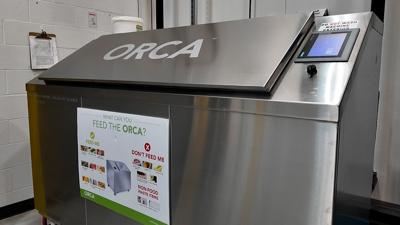MILFORD, Del. - The Food Bank of Delaware in Milford is using new technology to break down food waste.
The new machine, called the ORCA, stands for Organic Recycling Conversion Alternative. It processes between 800 and 1,000 pounds of food waste daily.
"It uses air, microbes, water and temperature to digest and accelerate the digestion of organic food waste. It is very similar to a mechanical stomach, with biology involved to, as a byproduct, have only liquid come out and go to its end goal of wastewater treatment instead of the landfill," said Douglas Horner, managing partner at Earth Bio Technologies.
The food digester, which costs around $35,000, is loaded throughout the day in 20-, 30- and 40-pound increments in a very simple way for staff at the food bank.
"This enables the food that maybe it's expired or, for whatever reason, is not set to go into a truck to go to a home and onto someone's table. Eventually, that food is actually being put into the ORCA, and that is being digested so that it goes into the environment very safely," said Cathy Kanefsky, president and CEO of the Food Bank of Delaware.
According to officials, one of the benefits of using this new technology is that it avoids methane gases that are produced in landfills from organics.
"Certain food groups will digest and break down faster. Fruits and vegetables with a lot of water content break down rapidly. Starches and meats, and other heavier food groups, will take a little bit more time," Horner said.
The Food Bank of Delaware says having the ORCA at its Milford facility ensures that their hunger relief work is matched by a deep commitment to the environment.
Keep Delaware Beautiful worked with the Delaware Solid Waste Authority to move this project forward.







